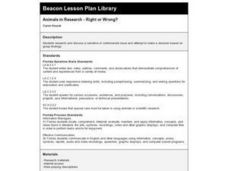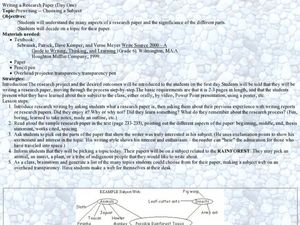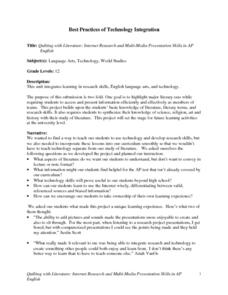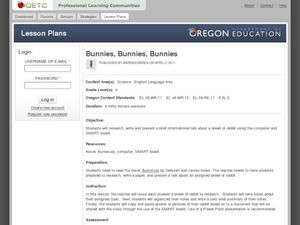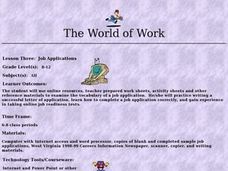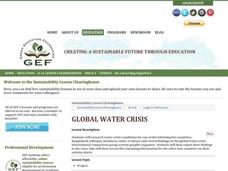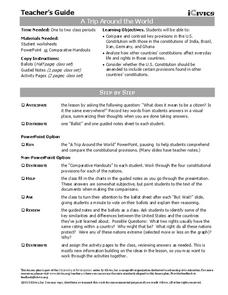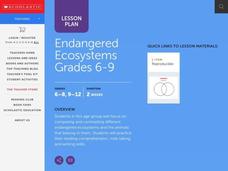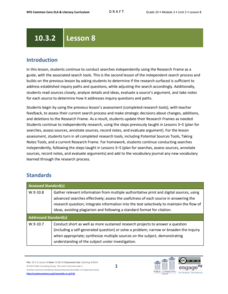Curated OER
Animals in Research - Right or Wrong?
Students research animal testing in scientific research. They role-play a research scientist, teacher, animal rights activist, or cosmetics manufacturer, and develop an argument for or against animal testing.
Curated OER
Mesearch: A Reason for Research
Students complete a research activity about themselves. They access an article on brainstorming and identifying personality traits. Students brainstorm about their personality traits and view a related PowerPoint. Students create their...
Curated OER
Choosing a Subject for a Research Paper
Students choose an appropriate subject for a research project. In this choosing a research subject instructional activity, students discuss the purpose and process of writing a research paper and read a sample paper. Students...
Curated OER
Quilting with Literature: Internet Research and Multi-Media Presentation Skills in AP English
Have your class acquire research skills such as using hotlists and evaluating websites while they study major literary eras. They create multimedia presentation using information from the Internet research.
Curated OER
Bunnies, Bunnies, Bunnies
Using rabbits as the theme, learners do research and create a class project. In this lesson plan, they begin by listening to Bunnicula by Deborah and James Howe, then they do research on a particular breed of rabbit, and, finally, create...
Curated OER
The World of Work: Job Applications
Young scholars use online resources and activities to examine the vocabulary of a job application. In this job application lesson, students review and take sample online job readiness exams. Young scholars read a publication about...
Curated OER
Global Water Crisis
Assign ecologists one of five countries that struggle with access to clean water. They research the water crisis in that country and then present information to classmates. A handout was designed for each country, and a worksheet on...
Curated OER
George Winter Lesson Plan 3
Bring language arts and U.S. history together in this lesson, which prompts middle and high schoolers to gather biographical information about Abraham Lincoln. They compare and contrast information written about his childhood and discuss...
Manchester College
Spain – Culture and Famous Landmarks
Introduce your class to Spain and liven up the class period with some Spanish pop music! Learners view a presentation about Spain and take notes on the information before watching a couple of music videos in Spanish. They use listening...
EngageNY
Research: Identifying Categories for Our Research About the Wheelwright
Here is a fine instructional activity on reading and understanding expository text designed for 4th graders. With a partner, learners read a passage of text about a machine called a wheelright. This machine was commonly used in...
iCivics
A Trip Around the World
How do the rights of citizens in other countries, such as India, Germany, Brazil, and Iran, compare to those of Americans? Take a closer look at the provisions of various foreign constitutions, and compare and contrast the protections...
ARKive
Temperate Rainforest in the Pacific Northwest
Explore the amazing temperate rainforest of the Pacific Northwest. Your class starts by investigating the animals and plants of the Northwest, specifically Washington, and then research an animal population common to the area. In small...
K12 Reader
A Planet in the Solar System
Take young scientists on an exploration of the cosmos with this cross-curricular writing exercise. Tasked with producing an expository composition describing a planet of their choosing, students perform research and...
California Department of Education
Possible Careers
Is a STEM career the right choice for me? Lesson four in a six-part career and college readiness series introduces seventh graders to the world of STEM occupations. Individuals use their Holland code results to select, research, and...
EngageNY
Introducing Module 4B: “Water Is Life”
Learners take a gallery walk around the classroom to view various images and quotes. As they walk, they write down what they notice and wonder about what they see. After discussing their notice and wonder notes, they read the...
Teach Engineering
Inside the DNA
Get your class to take a closer look at DNA. Pupils conduct research to determine the methods used by scientists to analyze the molecular structure of DNA. The class members investigate different types of molecular imaging along with gel...
Curated OER
Endangered Ecosystems
Reading comprehension and note-taking skills are practiced as young ecologists embark on this journey. Explorers visit a website where they will read about three ecosystems that are in danger. They use interactive programs to build a...
National Geographic
Australia, Antarctica, and Oceana
Go on a traveling adventure throughout Australia, Oceana, and Antarctica! This textbook excerpt offers a full unit of study that can easily be supplemented by extra projects or research materials. Learners study maps, read about...
EngageNY
Why Were Logarithms Developed?
Show your class how people calculated complex math problems in the old days. Scholars take a trip back to the days without calculators in the 15th installment of a 35-part module. They use logarithms to determine products of numbers and...
EngageNY
Grade 10 ELA Module 3: Unit 2, Lesson 8
Take it one step at a time. Scholars use the steps learned in lessons three through five to guide their independent research. While using the steps, learners complete research tool organizers to record their thinking, sources, and...
EngageNY
Local Sustainable Food Chain: Determining Cascading Consequences Using The Omnivore’s Dilemma
What are the consequences of the local, sustainable food chain? Research teams explore the question as they review Michael Pollan's The Omnivore's Dilemma. The teams complete Cascading Consequences charts and then choose research topics...
NOAA
Technology I
Isn't technology great? The 12th installment of a 23-part NOAA Enrichment in Marine sciences and Oceanography (NEMO) program introduces technology that marine scientists use. Pupils take part in an activity using conductivity,...
Teach Engineering
Clean it Up!
Harness the power of bacteria. Scholars see how using organisms that exist in nature can help solve human problems in the process known as bioremediation. They research and discuss several successful examples, such as using oil-eating...
US Mint
Rename That State!
As Shakespeare famously wrote, "A rose by any other name would smell as sweet," but can the same be said for a state? For this elementary geography lesson, learners are assigned specific states to research using the information...
Other popular searches
- Taking Notes for Research
- Research Taking Notes
- Note Taking Skills Research
- Note Taking for Research
